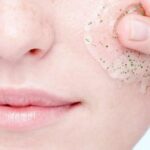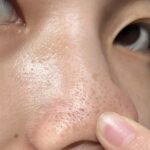Using the wrong cleanser can be not only ineffective but also damaging to your skin. Here are four types of cleansers you should stop using daily to protect and maintain healthy skin in the new year.
Expired or open-jar expired cleanser
Many people overlook the expiration dates of cleansers, but this is crucial. When a product is past its use-by date or has been opened for too long, its ingredients may degrade, reducing its cleansing effectiveness and increasing the risk of bacteria growth, which can be harmful to the skin.

Don’t ignore the expiration date of your cleanser.
Regularly check the expiration date and open-jar lifespan (usually indicated on the packaging). If your cleanser has an odd smell, changed texture, or discoloration, it’s best to discontinue use and replace it with a new one to ensure skin safety.
Cleansers with physical exfoliants
Cleansers with physical exfoliants, such as scrub particles, are often marketed for their deep cleansing and exfoliating abilities. However, using these daily can damage the skin, strip away its natural protective barrier, and lead to irritation or inflammation.
Instead of daily physical exfoliation, opt for chemical exfoliants with ingredients like AHA or BHA for a gentler approach. If you still enjoy the feeling of physical exfoliation, limit its use to once or twice a week.
Cleansers with a high pH level
pH levels play a critical role in skin care. Cleansers with a high pH (above 7) can disrupt the skin’s natural protective barrier, leading to dryness, irritation, and increased acne breakouts.
Healthy skin maintains an ideal pH range between 4.5 and 5.5. Choose cleansers with a pH level within this range to support your skin’s natural balance. Gentle cleansers with a lower pH will effectively cleanse without causing damage.

Avoid cleansers with a high pH that can disrupt your skin’s natural barrier.
Cleansers not suited for your skin type
Many people choose cleansers based on impulse rather than considering their skin type. For example, if you have oily skin and use a richly formulated or highly moisturizing cleanser, your pores may become clogged, leading to acne. Conversely, using a harsh, stripping cleanser on dry skin can further dehydrate and sensitize it.
To avoid this, understand your skin type. If you have oily skin, opt for cleansers that help control sebum production. For dry skin, look for products rich in moisturizing ingredients like glycerin or ceramides. Sensitive skin requires gentle, fragrance- and alcohol-free formulas to prevent irritation.
Steer clear of damaging physical exfoliants, high-pH cleansers, products that don’t match your skin type, and expired cleansers. With these simple adjustments, you’ll help keep your skin healthy, glowing, and vibrant throughout the year!














